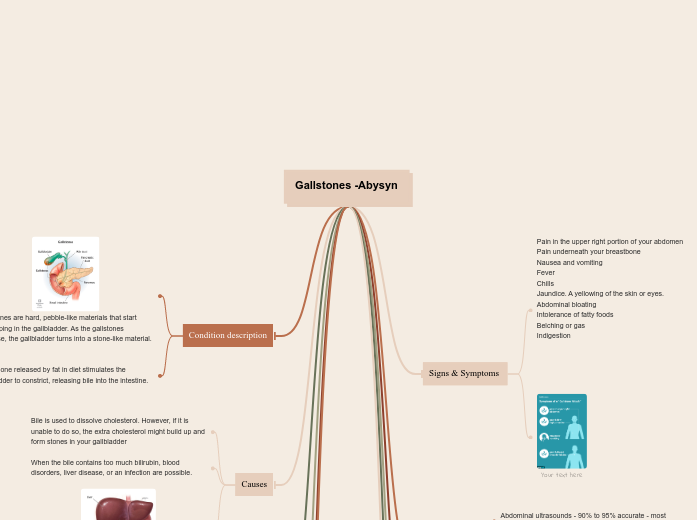Gallstones -Abysyn
Signs & Symptoms
Pain in the upper right portion of your abdomen
Pain underneath your breastbone
Nausea and vomiting
Fever
Chills
Jaundice. A yellowing of the skin or eyes.
Abdominal bloating
Intolerance of fatty foods
Belching or gas
Indigestion
Your text here
Diagnosis
Abdominal ultrasounds - 90% to 95% accurate - most commonly used
Endoscopic ultrasound (EUS)
Blood tests
Prevention & Prognosis
Cut down in cholesterol
Losing weight
Product visuals
Your text here
Canadian Development
Open cholecystectomy is the classic surgical treatment for gallstones which requires an abdominal incision. The patient is told to stay in the hospital for 5-7 days after surgery.
Definitions
Bile
Fluid is made by the liver which has a role to help with digestion. It breaks down fat and is stored in the gallbladder
Gallbladder
The gallbladder is part of the digestive system
Located under the liver.
bilirubin
Yellowish pigment that is made during the breakdown of red blood cells. Passes through the liver, and is eventually excreted out of the body.
Cholesterol
Fat is made in the liver and can be found in blood, as well as all cells of the body.
Endoscope
A long, flexible, lighted tube to diagnose and treat organs and structures inside the body.
Condition description
Gallstones are hard, pebble-like materials that start developing in the gallbladder. As the gallstones increase, the gallbladder turns into a stone-like material.
A hormone released by fat in diet stimulates the gallbladder to constrict, releasing bile into the intestine.
Causes
Bile is used to dissolve cholesterol. However, if it is unable to do so, the extra cholesterol might build up and form stones in your gallbladder
When the bile contains too much bilirubin, blood disorders, liver disease, or an infection are possible.
When the gallbladder does not empty, it might produce extremely concentrated bile.
Treatment
Surgery
Endoscopic retrograde cholangiopancreatography (ERCP)
The combination of X-ray and the use of an endoscope to treat problems in the liver, pancreas, bile ducts, and gallbladder.
References
APA format
Begum, J., Wiginton, K., & Braverman, J. (2023, December 4). Gallstones (Cholelithiasis): Symptoms, Causes, and Treatments. WebMD. Retrieved May 13, 2024, from https://www.webmd.com/digestive-disorders/gallstones
Gallstones. (n.d.). Johns Hopkins Medicine. Retrieved May 13, 2024, from https://www.hopkinsmedicine.org/health/conditions-and-diseases/gallstones
Gallstones. (n.d.). Canadian Liver Foundation. Retrieved May 13, 2024, from https://www.liver.ca/patients-caregivers/liver-diseases/gallstones/
Gallstones - Symptoms & causes. (n.d.). Mayo Clinic. Retrieved May 13, 2024, from https://www.mayoclinic.org/diseases-conditions/gallstones/symptoms-causes/syc-20354214
Overview - - - Gallstones. (n.d.). NHS. Retrieved May 13, 2024, from https://www.nhs.uk/conditions/gallstones/
Treatment for Gallstones - NIDDK. (n.d.). National Institute of Diabetes and Digestive and Kidney Diseases. Retrieved May 13, 2024, from https://www.niddk.nih.gov/health-information/digestive-diseases/gallstones/treatment
What to do about gallstones. (2023, July 20). Harvard Health. Retrieved May 13, 2024, from https://www.health.harvard.edu/womens-health/what-to-do-about-gallstones
Biotechnology
ESWL
Extracorporeal shock wave lithotripsy. Extracorporeal shock wave lithotripsy (ESWL) is a nonsurgical method for treating gallstones. You can get this procedure if your gallbladder works well and your stones are tiny.
Effects on the Body
Skin turns yellow
Permanent Brain Damage
Yellow eyes
the bilirubin begins to dissolve in the body and brain tissues.
